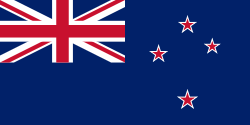| New Zealand at the 1952 Summer Olympics | |
|---|---|
 | |
| IOC code | NZL |
| NOC | New Zealand Olympic and British Empire Games Association |
| Website | www |
| in Helsinki | |
| Competitors | 14 in 5 sports |
| Flag bearer | Harold Cleghorn |
| Officials | 3 |
| Medals Ranked 24th |
|
| Summer Olympics appearances (overview) | |
| Other related appearances | |
New Zealand at the 1952 Summer Olympics was represented by a team of 14 competitors (and one travelling reserve) and three officials. Selection of the team for the Games in Helsinki, Finland, was the responsibility of the New Zealand Olympic and British Empire Games Association. New Zealand's flagbearer at the opening ceremony was Harold Cleghorn. The New Zealand team finished equal 24th on the medal table, winning a total of three medals, one of which was gold.